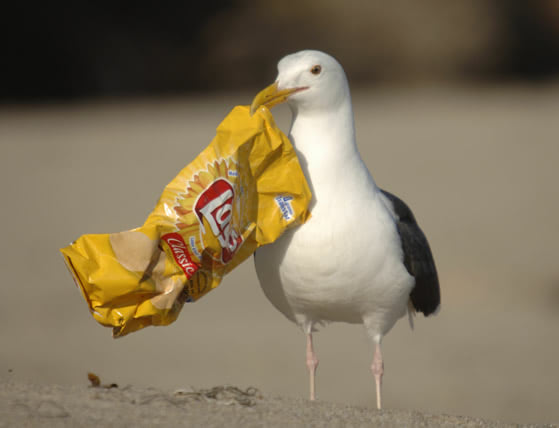Have you ever been to the beach and been attacked by a seagull for a potato chip? These birds choose this food over their natural selection because people-food is in more abundance and relatively easy to get. Think about it. Seagulls and other shore animals can rely (not that they should) with a steady supply of food from June - August. And every year we flock to beaches in ever-growing numbers. To meet the demands of so many consumers, towns have developed their fragile coastal and marine ecosystems into housing and recreational facilities.
Unfortunately, it’s becoming harder to miss the waste and carelessness of coastal tourism. Resorts and cruises dump sewage into the ocean. Occasionally, boats spill oil and chemicals that kill wildlife. Beaches often close their waters to swimmers due to high risk of bacteria-borne illness. Beachgoers leave trash and food behind, which is often consumed by animals. People disturb ecosystems, trying to interact with marine animals or touch coral reefs, or take home shells as souvenirs. This doesn’t make for a pleasant vacation.
While we can’t just leave the coast permanently without upsetting the delicate balance of this new environment we created, we can take better care of it to ensure that it is around for years to come.
Avoid water contamination. To keep paint from peeling off boats during the winter (and then coming off in the water) simply cover the boat with a water-based mold release wax. Boaters should also keep their boats well-maintained to avoid oil leaks or spills, and should use environmentally-friendly products when cleaning and protecting their vessels.
Properly dispose of waste. Put trash, including food, in proper receptacles and purchase recyclable products. Better yet, minimize the number of plastics you bring with you and switch to reusable containers.
Be mindful of marine wildlife. Keep your distance from birds, fish and other animals, and never feed them. Be aware of where they nest and avoid those areas. Likewise, swimmers can protect both the beach’s fragile coral ecosystems, as well as their skin with environmentally safe sunscreens.
We can’t deny that humans are changing the world around us. When it comes to our beaches however, let’s try to make that impact a positive one for all involved, so that thousands, human and animal alike, can flock to their favorite beaches each year.
Sources: Live Science, WNSHAW, Fort Myers Beach Observer.
Image: WCAI

Share your thoughts and join the technology debate!
Be the first to comment